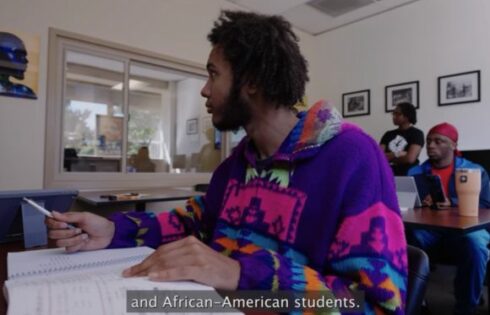
Students enrolled in the Kilachand Honors College at Boston University used to have a required class called “Modernity and its Discontents.”
The freshman seminar included readings by Friedrich Nietzsche, Virginia Woolf and Sigmund Freud, and stood as a prime example of an attempt by the honors college to offer students an education grounded in a classical liberal arts tradition.
But “Modernity and its Discontents” is gone, and so is a popular professor who used to co-teach it, Anna Katsnelson.
In late May, she was abruptly dismissed from her post as assistant director of academic affairs for the honors college at the private university, and for many students enrolled in the program, it was the last straw.
A large contingent of students and recent grads of Kilachand Honors College say the program has taken a wrong turn in recent years. They argue it has largely abandoned its original mission to offer a challenging curriculum anchored in a Western canon and has lost its close-knit community feel centered on a passion for academic rigor and diversity of thought.
In other words, the Socratic method of learning has been scrapped and the honors college has become just another typical liberal arts program with an echo chamber of leftism, its critics say.
Some 120 students and alumni of the honors college — roughly one-third of its enrollment — recently demanded answers, saying they are “devastated” by the termination of Katsnelson, who embodied “the community and spirit of the college” with her open-door policy, personal investment in students’ lives, and passion for intellectual debate.
“We feel that Professor Katsnelson’s dismissal points to larger problems within the KHC community,” the students stated in a May 24 letter to Kilachand Honors College leaders.
“In the past two years, the administrative office has become less welcoming and approachable. … Furthermore, many of us chose KHC because of its rigorous academic pathway but stayed because we found a home there. We do not want the friendly environment that welcomed us as freshmen to be replaced by a purely academic institution, one that fails to emphasize the close personal relationships that we consider to be KHC’s greatest quality,” the letter added.
Casandra Oldfield, a student enrolled in the honors college, told The College Fix in a recent interview that several concerned students met with the president of the university, Robert Brown, in late June to voice their concern.
But in early August, Brown effectively informed students their concerns would not result in a large-scale course reversal. Instead, he urged better communication between students and faculty leadership through the Kilachand Leadership Advisory Board, launched in the spring of 2017 to facilitate discussions between administration and students.
“As I did at our meeting, I acknowledge your concerns about the KHC curriculum, including changes in content, format and teaching pedagogies used in several of the classes. Although it is not my place to intervene with the work of our faculty, I will bring these topics to the attention of the KHC leadership. I also hope these topics will be brought forward through the KLAB, as it is the right forum for open and thoughtful discussion among the KHC faculty and students,” he wrote in an Aug. 5 email to students obtained by The College Fix.
Oldfield told The Fix she is disappointed by Brown’s response, calling it a “dead end.” Making matters worse, she said, some staff have intimidated students who speak out about the concerns by threatening to withdraw academic support, such as letters of recommendations.
The biggest problem, she added, is when her academic mentor, Professor Katsnelson, was booted out the program, it effectively removed the last remaining vestige of “diversity of thought and opinion” at the honors college.
She said Katsnelson was “the only voice of opposition in what had otherwise become an echo chamber of clinical, bland liberalism and an emphasis on turning out numbers over creating individuals prepared for the rigors of research and life.”
Another point of contention, Oldfield said, is a decision to cut the “Sophomore Summer” program, which provided around 20 students with funding for research, studying abroad, and other academic pursuits. More recently it was replaced with a trip to Lebanon for a very small group of students, she said.
Asked to address these concerns, Colin Riley, executive director of media relations for Boston University, told The College Fix the honors college is doing “very well.”
“[T]he Kilachand Honors College was launched in 2010, and, as Boston University’s undergraduate honors college, is attracting outstanding students to BU and providing an innovative and compelling curriculum and community for its students,” he said via email. “Kilachand is doing very well, and as with all of our programs, it undergoes continuous assessment and revision to ensure that we are being both responsive to our students and utilizing current pedagogies.”
“The new leadership of the College is committed to working closely with the students and faculty in the College to ensure that there are open lines of communication, as well as an open and collegial atmosphere. We know of no cases in which any Kilachand Honors College student has been denied letters of recommendation by any member of the faculty or administration of KHC.”
Certainly the college has had growing pains since its inception.
A February 2016 op-ed in the student newspaper declared “Nobody really knows what Kilachand is, and it’s killing the people in it.” The student columnist accused the college of being too “cliquey” and demanding.
In April 2017, an op-ed weighed in that the college has “suffered a long-standing identity crisis.”
“Although we are immersed within different disciplines, we are constricted by rigid class structures that often prevent students from pursuing their actual course of study or partaking in student activities,” the column stated. “ … In a true testament to Kilachand’s shortcomings, our numbers dwindle significantly each semester, as students drop the program in favor of taking classes more relevant to their major.”
In January 2017, English Professor Carrie Preston, then-director of the Women, Gender, and Sexuality Studies Program, began as the honor college’s new director. In contrast, the original director was a historian. Under Preston, “there is much less diversity of thought and the materials tend toward one direction,” Oldfield said.
She added that she and many of her peers agree the overall academics are easier as well, and there has been a move away from the great books curriculum and Socratic method.
“For example our freshmen year we used to read a bunch of opinion — Freud, Nietzsche, Virginia Woolf — we watched a bunch of different movies, Soviet films. It was designed so you could hear a variety of opinions, some of which would make you mad and stimulate debate. That was the point,” she said.
“Now this year the freshman class read one book and analyzed it the entire time,” she said, adding the freshmen she spoke to said the class felt like it had a prescribed agenda not conducive to intellectual debate and was as easy as a regular first-year writing course.
The book students read in the spring semester was “Swing Time” by Zadie Smith, a contemporary novel that deals with identity politics written by a mixed-race author.
Some familiar with the situation spoke on the condition of anonymity to The College Fix, saying they felt they could face retaliation if their names are published.
One said they were disappointed by a lecture Kilachand students could attend for academic credit to meet their co-curricular requirements, a talk given last spring that made claims against capitalism and other topics unsubstantiated with facts and evidence.
Said another: “The co-curriculars that have been sponsored by the college ever since the new administration took over almost exclusively have this social justice kind of agenda. I am a very liberal guy, but I also deeply value the power of critical thinking.”
Another biased co-curricular cited as an example was a panel of education experts who all agreed social justice should be taught in public schools: “They all sat there and had the exact same point of view. The consensus among the group was that social justice should be taught in school and differences in race and gender identity should be dealt with very early. It just kind of struck me, there is a room with 100 kids and the panelists are having this discussion and there’s no counter to anything. No one is sitting up there and saying, ‘That’s an interesting point, but have you considered this?’”
Previous co-curriculars, in contrast, included field trips to the modern ballet, Museum of Fine Arts, or foreign film screenings. In something of an ironic twist, Charles Dellheim, the founding director of the honors college, hosted in 2016 a co-curricular with speaker Frank Bruni, a New York Times columnist, on the importance of diversity of thought. It was the last co-curricular he would organize before he left.
Indeed, the college’s original vision was set up as a way to reinvigorate the classical liberal arts program, teaching the great books but across disciplines, and opening students up to the idea of what it means to be an ethical human being, and what it means to be a citizen of the world with Western canon texts underpinning that curriculum. That vision has been gutted, critics say.
In a May 2018 emailed memo to students, Preston defended the changes.
“Improving the Kilachand community has been a crucial goal of mine since I took on the position of director – during a year in which only 30% of the students who began in Kilachand graduated from the college,” Preston stated in the email, a copy of which was obtained by The College Fix.
“In the surveys I conducted with those who left the college before my arrival, I read repeatedly about a problematic cliquishness that felt exclusionary to some students and a perception that there was a privileged group of favorite students who got to go to special breakfasts and lunches. Perhaps my attempts to be inclusive and impartial feel like a ‘clinical approach.’ … That is certainly something to work on, as I do not desire to be a ‘clinical’ person,” she continued.
“But, Kilachand has never retained more than half of the students that started in the college. I, and the Boston University administration more generally, consider that a failure for an academic community with remarkable resources like Kilachand. Why were up to 70% of the students leaving the college? It’s not because the community was working. I want to make it work — for everyone — not just a privileged few.”
However, that retention rate is on par with other honors colleges.
MORE: Talk at Boston University criticizes capitalism, self help books, the United States
MORE: Reed College to revise Western Civ class after protests call it too ‘Caucasoid’
IMAGE: Odua Images / Shutterstock
Like The College Fix on Facebook / Follow us on Twitter





Please join the conversation about our stories on Facebook, Twitter, Instagram, Reddit, MeWe, Rumble, Gab, Minds and Gettr.